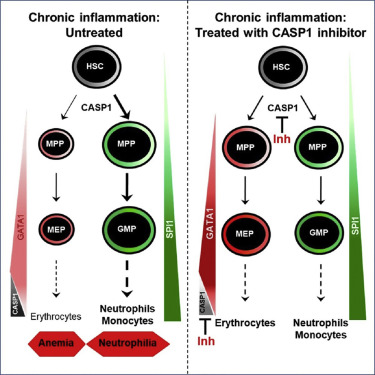Our official English website, www.x-mol.net, welcomes your
feedback! (Note: you will need to create a separate account there.)
Inflammasome Regulates Hematopoiesis through Cleavage of the Master Erythroid Transcription Factor GATA1.
Immunity ( IF 25.5 ) Pub Date : 2019-06-04 , DOI: 10.1016/j.immuni.2019.05.005 Sylwia D Tyrkalska 1 , Ana B Pérez-Oliva 1 , Lola Rodríguez-Ruiz 1 , Francisco J Martínez-Morcillo 1 , Francisca Alcaraz-Pérez 2 , Francisco J Martínez-Navarro 1 , Christophe Lachaud 3 , Nouraiz Ahmed 4 , Timm Schroeder 4 , Irene Pardo-Sánchez 1 , Sergio Candel 1 , Azucena López-Muñoz 1 , Avik Choudhuri 5 , Marlies P Rossmann 5 , Leonard I Zon 6 , María L Cayuela 2 , Diana García-Moreno 1 , Victoriano Mulero 1
Immunity ( IF 25.5 ) Pub Date : 2019-06-04 , DOI: 10.1016/j.immuni.2019.05.005 Sylwia D Tyrkalska 1 , Ana B Pérez-Oliva 1 , Lola Rodríguez-Ruiz 1 , Francisco J Martínez-Morcillo 1 , Francisca Alcaraz-Pérez 2 , Francisco J Martínez-Navarro 1 , Christophe Lachaud 3 , Nouraiz Ahmed 4 , Timm Schroeder 4 , Irene Pardo-Sánchez 1 , Sergio Candel 1 , Azucena López-Muñoz 1 , Avik Choudhuri 5 , Marlies P Rossmann 5 , Leonard I Zon 6 , María L Cayuela 2 , Diana García-Moreno 1 , Victoriano Mulero 1
Affiliation

|
Chronic inflammatory diseases are associated with altered hematopoiesis that could result in neutrophilia and anemia. Here we report that genetic or chemical manipulation of different inflammasome components altered the differentiation of hematopoietic stem and progenitor cells (HSPC) in zebrafish. Although the inflammasome was dispensable for the emergence of HSPC, it was intrinsically required for their myeloid differentiation. In addition, Gata1 transcript and protein amounts increased in inflammasome-deficient larvae, enforcing erythropoiesis and inhibiting myelopoiesis. This mechanism is evolutionarily conserved, since pharmacological inhibition of the inflammasome altered erythroid differentiation of human erythroleukemic K562 cells. In addition, caspase-1 inhibition rapidly upregulated GATA1 protein in mouse HSPC promoting their erythroid differentiation. Importantly, pharmacological inhibition of the inflammasome rescued zebrafish disease models of neutrophilic inflammation and anemia. These results indicate that the inflammasome plays a major role in the pathogenesis of neutrophilia and anemia of chronic diseases and reveal druggable targets for therapeutic interventions.
中文翻译:

炎症小体通过切割主要的红细胞转录因子 GATA1 来调节造血。
慢性炎症性疾病与造血功能改变有关,可能导致中性粒细胞增多和贫血。在这里,我们报告不同炎性体成分的遗传或化学操作改变了斑马鱼中造血干细胞和祖细胞 (HSPC) 的分化。尽管炎症小体对于 HSPC 的出现是可有可无的,但它本质上是其骨髓分化所必需的。此外,Gata1 转录物和蛋白质数量在炎性体缺陷幼虫中增加,从而促进红细胞生成并抑制骨髓生成。这种机制在进化上是保守的,因为炎性体的药理学抑制改变了人类红白血病 K562 细胞的红系分化。此外,caspase-1 抑制迅速上调小鼠 HSPC 中的 GATA1 蛋白,促进其红系分化。重要的是,炎症小体的药理学抑制拯救了斑马鱼中性粒细胞炎症和贫血的疾病模型。这些结果表明,炎症小体在中性粒细胞增多症和慢性疾病贫血的发病机制中起主要作用,并揭示了治疗干预的药物靶点。
更新日期:2019-06-04
中文翻译:

炎症小体通过切割主要的红细胞转录因子 GATA1 来调节造血。
慢性炎症性疾病与造血功能改变有关,可能导致中性粒细胞增多和贫血。在这里,我们报告不同炎性体成分的遗传或化学操作改变了斑马鱼中造血干细胞和祖细胞 (HSPC) 的分化。尽管炎症小体对于 HSPC 的出现是可有可无的,但它本质上是其骨髓分化所必需的。此外,Gata1 转录物和蛋白质数量在炎性体缺陷幼虫中增加,从而促进红细胞生成并抑制骨髓生成。这种机制在进化上是保守的,因为炎性体的药理学抑制改变了人类红白血病 K562 细胞的红系分化。此外,caspase-1 抑制迅速上调小鼠 HSPC 中的 GATA1 蛋白,促进其红系分化。重要的是,炎症小体的药理学抑制拯救了斑马鱼中性粒细胞炎症和贫血的疾病模型。这些结果表明,炎症小体在中性粒细胞增多症和慢性疾病贫血的发病机制中起主要作用,并揭示了治疗干预的药物靶点。











































 京公网安备 11010802027423号
京公网安备 11010802027423号